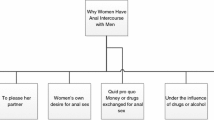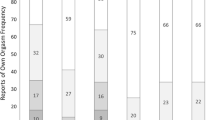Abstract
Many individuals who experience nonconsensual sexual experiences (NSEs) do not identify their experiences with common sexual violence labels (e.g., sexual assault, rape, or abuse), and cognitive mechanisms of identification have yet to be examined. Identification may involve the integration of the experience into sexual self-schemas, which would have implications for sexual well-being. Women were recruited through Amazon’s Mechanical Turk (N = 818) to take part in an anonymous online study of sexual experiences. The current study assessed the relationship between textually derived sexual self-schemas and sexual function (measured by the Female Sexual Function Index) in women (M = 35.37 years, SD = 11.27) with NSEs who both did (identifiers, n = 305) and did not (non-identifiers, n = 176) identify with common sexual violence labels, in comparison with those with no NSEs (n = 337). Text analyses revealed nine sexual self-schema themes in participants’ essays: Virginity, Openness, Erotophilia, NSEs, Romantic, Sexual Activity, Warmth, Relationships, and Reflection. Analyses demonstrated that identifiers reported significantly poorer sexual functioning and less use of both the Warmth and Openness themes than those with no NSEs. Identifiers also invoked the NSE theme more frequently than both those with no NSE histories and non-identifiers. While greater prominence of the Warmth theme was predictive of greater sexual functioning for both non-identifiers and those with no NSEs, this was not true for identifiers. Instead, the NSE theme was significantly predictive of lower sexual functioning in identifiers. The results suggest that NSE identification may result in greater internalization of the NSE into one’s sexual self-schema and, in turn, predict decrements in sexual functioning. The results are discussed in relation to identification interpretation and clinical intervention.


Similar content being viewed by others
References
Andersen, B. L., & Cyranowski, J. M. (1994). Women’s sexual self-schema. Journal of Personality and Social Psychology, 67, 1079–1100. https://doi.org/10.1037/0022-3514.67.6.1079.
Botta, R. A., & Pingree, S. (1997). Interpersonal communication and rape: Women acknowledge their assaults. Journal of Health Communication, 2, 197–212. https://doi.org/10.1080/108107397127752.
Boyd, R. L. (2017). MEH: Meaning extraction helper (Version 1.4.15) [Software]. Retrieved from http://meh.ryanb.cc/. Accessed 30 Jan 2017.
Boyd, R. L., & Pennebaker, J. W. (2015). A way with words: Using language for psychological science in the modern era. In C. Dimofte, C. Haugtvedt, & R. Yalch (Eds.), Consumer psychology in a social media world (pp. 222–236). New York: Routledge Publishers.
Boyd, R. L., Wilson, S. R., Pennebaker, J. W., Kosinski, M., Stillwell, D. J., & Mihalcea, R. (2015, April). Values in words: Using language to evaluate and understand personal values. In International association for the Advancement of Artificial Intelligence (AAAI) Conference on Web and Social Media (pp. 31–40). Retrieved from https://www.aaai.org/ocs/index.php/ICWSM/ICWSM15/paper/view/10482.
Buhrmester, M., Kwang, T., & Gosling, S. D. (2011). Amazon’s Mechanical Turk: A new source of inexpensive, yet high quality data? Perspectives on Psychology Science, 6, 3–5. https://doi.org/10.1177/1745691610393980.
Cantor, D., Fisher, B., Chibnall, S., Townsend, R., Lee, H., Bruce, C., & Thomas, G. (2015). Report on the AAU Campus Climate Survey on Sexual Assault and Sexual Misconduct. Washington, DC: Association of American Universities. Retrieved from http://www.aau.edu/uploadedFiles/AAU_Publications/AAU_Reports/Sexual_Assault_Campus_Survey/Report%20on%20the%20AAU%20Campus%20Climate%20Survey%20on%20Sexual%20Assault%20and%20Sexual%20Misconduct.pdf. Accessed 18 May 2017.
Chung, C. K., & Pennebaker, J. H. (2008). Revealing dimensions of thinking in open–ended self-descriptions: An automated meaning extraction method for natural language. Journal of Research in Personality, 42, 96–132. https://doi.org/10.1016/j.jrp.2007.04.006.
Cleere, C., & Lynn, S. J. (2013). Acknowledged versus unacknowledged sexual assault among college women. Journal of Interpersonal Violence, 28, 2593–2611. https://doi.org/10.1177/0886260513479033.
Derogatis, L. R., & Melisaratos, N. (1979). The DSFI: A multidimensional measure of sexual functioning. Journal of Sex and Marital Therapy, 5, 244–281. https://doi.org/10.1080/00926237908403732.
Harned, M. S. (2004). Does it matter what you call it? The relationship between labeling unwanted sexual experiences and distress. Journal of Consulting and Clinical Psychology, 72, 1090–1099. https://doi.org/10.1037/0022-006X.72.6.1090.
Holguin, G., & Hansen, D. J. (2003). The “sexual abused child”: Potential mechanisms of adverse influences of such a label. Aggression and Violent Behavior, 8, 645–670. https://doi.org/10.1016/S1359-1789(02)00101-5.
Kahn, A. S., Jackson, J., Kully, C., Badger, K., & Halvorsen, J. (2003). Calling it rape: Differences in experiences of women who do or do not label their sexual assault as rape. Psychology of Women Quarterly, 27, 233–242. https://doi.org/10.1111/1471-6402.00103.
Katerdahl, D., Burge, S., & Kellogg, N. (2006). Factors that predict how women label their own childhood sexual abuse. Journal of Child Sexual Abuse, 15, 43–54. https://doi.org/10.1300/J070v15n02_03.
Kelley, E. L., & Gidycz, C. A. (2015). Labeling of sexual assault and its relationship with sexual functioning: The mediating role of coping. Journal of Interpersonal Violence, 30, 348–366. https://doi.org/10.1177/0886260514534777.
Kilimnik, C. D., Trapnell, P. D., & Humphreys, T. P. (2016). Negative affectivity in female’s identification of their nonconsensual sexual experiences and sexual dissatisfaction. Canadian Journal of Human Sexuality, 25, 177–185. https://doi.org/10.3138/cjhs.253-A1.
Layman, M. J., Gidycz, C. A., & Lynn, S. J. (1996). Unacknowledged versus acknowledged rape victims: Situational factors and posttraumatic stress. Journal of Abnormal Psychology, 105, 124–131. https://doi.org/10.1037/0021-843X.105.1.124.
Leonard, L. M., & Follette, V. M. (2002). Sexual functioning in women reporting a history of child sexual abuse. Review of the empirical literature and clinical implications. Annual Review of Sex Research, 13, 346–388. https://doi.org/10.1080/10532528.2002.10559809.
Littleton, H. L., Rhatigan, D. L., & Axsom, D. (2007). Unacknowledged rape: How much do we know about the hidden rape victim? Journal of Aggression, Maltreatment, & Trauma, 14, 57–74. https://doi.org/10.1300/J146v14n04_04.
Marx, B., & Soler-Baillo, J. (2005). The relationships among risk recognition, autonomic and self-reported arousal, and posttraumatic stress symptomatology in acknowledged and unacknowledged victims of sexual assault. Psychosomatic Medicine, 67, 618–624. https://doi.org/10.1097/01.psy.0000171809.12117.79.
Meston, C. M., Lorenz, T. A., & Stephenson, K. R. (2013). Effects of expressive writing on sexual dysfunction, depression, and PTSD in women with a history of childhood sexual abuse: Results from a randomized clinical trial. Journal of Sexual Medicine, 10, 2177–2189. https://doi.org/10.1111/jsm.12247.
Meston, C. M., Rellini, A. H., & Heiman, J. R. (2006). Women’s history of sexual abuse, their sexuality, and sexual self-schemas. Journal of Consulting and Clinical Psychology, 74, 229–236. https://doi.org/10.1037/0022-006X.74.2.229.
Meyer-Bahlburg, H. F. L., & Dolezal, C. (2007). The Female Sexual Function Index: A methodological critique and suggestions for improvement. Journal of Sex and Marital Therapy, 33, 217–224. https://doi.org/10.1080/00926230701267852.
Niehaus, A. F., Jackson, J., & Davies, S. (2010). Sexual self-schemas of female child sexual abuse survivors: Relationships with risky sexual behavior and sexual assault in adolescence. Archives of Sexual Behavior, 39, 1359–1374. https://doi.org/10.1007/s10508-010-9600-9.
Peterson, Z. D., & Muehlenhard, C. L. (2004). Was it rape? The function of women’s rape myth acceptance and definitions of sex in labeling their own experiences. Sex Roles, 51, 129–144. https://doi.org/10.1023/B:SERS.0000037758.95376.00.
Peterson, Z. D., & Muehlenhard, C. L. (2011). A match-and-motivation model of how women label their nonconsensual sexual experiences. Psychology of Women Quarterly, 35, 558–570. https://doi.org/10.1177/0361684311410210.
Pulverman, C. S., Boyd, R. L., Stanton, A. M., & Meston, C. M. (2017). Changes in the sexual self-schema of women with a history of childhood sexual abuse following expressive writing treatment. Psychological Trauma, 9, 181–188. https://doi.org/10.1037/tra0000163.
Rellini, A., & Meston, C. (2007). Sexual function and satisfaction in adults based on the definition of child sexual abuse. Journal of Sexual Medicine, 4, 1312–1321. https://doi.org/10.1111/j.1743-6109.2007.00573.x.
Rellini, A. H., & Meston, C. M. (2011). Sexual self-schemas, sexual dysfunction, and the sexual responses of women with a history of childhood sexual abuse. Archives of Sexual Behavior, 40, 351–362. https://doi.org/10.1007/s10508-010-9694-0.
Rodríguez-Auarez, G., Ramirez-Ezparza, N., Pérez-Brena, N., & Boyd, R. L. (2017). Hablos Inglés y Español: Cultural self-schemas as a function of language. Frontiers in Psychology, 30, 885. https://doi.org/10.3389/fpsyg.2017.00885.
Rosen, R., Brown, C., Heiman, J., Leiblum, S., Meston, C., … D’Agostino, R. (2000). The Female Sexual Function Index (FSFI): A multidimensional self-report instrument for the assessment of female sexual function. Journal of Sex & Marital Therapy, 26, 191–208. https://doi.org/10.1080/009262300278597
Stanton, A. M., Boyd, R. L., Pulverman, C., & Meston, C. M. (2015). Determining women’s sexual self-schemas through advanced computerized text analysis. Child Abuse and Neglect, 46, 78–88. https://doi.org/10.1016/j.chiabu.2015.06.003.
Wilcox, R. R. (2010). Fundamentals of modern statistical methods (2nd ed.). New York, NY: Springer.
Acknowledgements
This work was supported by the Canadian Institutes of Health Research (Funding Reference Number: 152269, awarded to Chelsea Kilimnik in May 2017).
Author information
Authors and Affiliations
Corresponding author
Electronic supplementary material
Below is the link to the electronic supplementary material.
Appendix: NSEI
Appendix: NSEI


Rights and permissions
About this article
Cite this article
Kilimnik, C.D., Boyd, R.L., Stanton, A.M. et al. Identification of Nonconsensual Sexual Experiences and the Sexual Self-Schemas of Women: Implications for Sexual Functioning. Arch Sex Behav 47, 1633–1647 (2018). https://doi.org/10.1007/s10508-018-1229-0
Received:
Revised:
Accepted:
Published:
Issue Date:
DOI: https://doi.org/10.1007/s10508-018-1229-0




